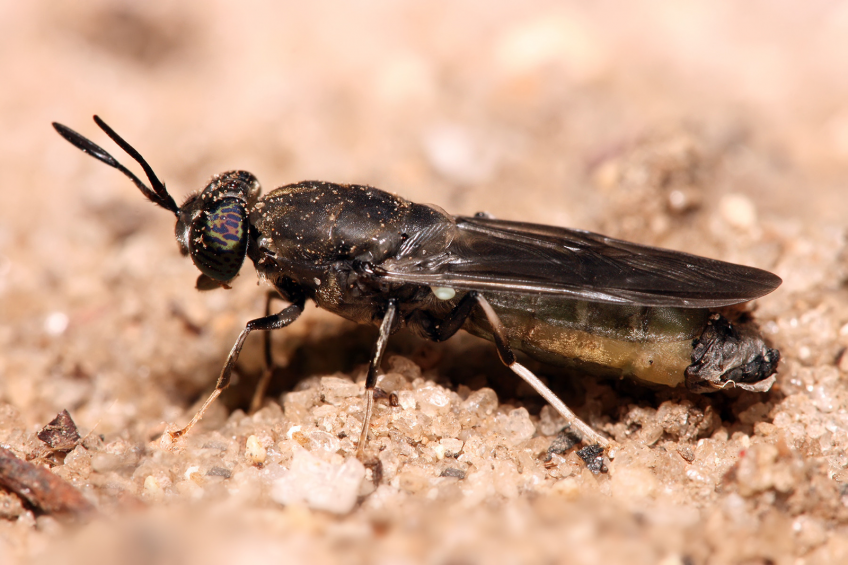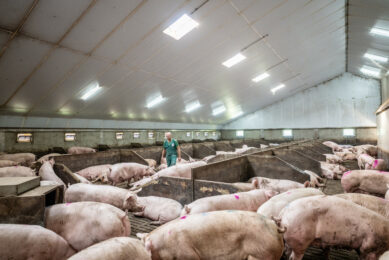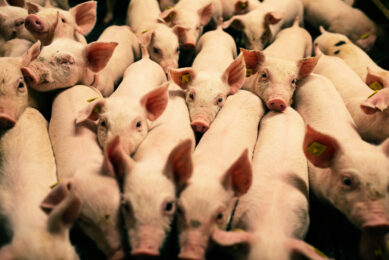A novelty: Insect oil in piglet feed

Insect oil is forming the basis of a new feed ingredient for weaner pigs – according to the manufacturers it’s a world’s first.
The weaner feed with the insect ingredient has potential to reduce bacteria, prevent diarrhoea and improve feed intake, stated animal nutrition Coppens Animal Feed and Protix in an interview with Pig Progress’ sister title All About Feed.
Protix is producer of insect oil and insect protein. The company is supplying the ingredient to Coppens, which further processes the components into a commercial pelleted feed in their feed mill in Helmond, the Netherlands.
Insect oil contains high level of lauric acid
Tarique Arsiwalla, founder of Protix, told All About Feed: “We started our cooperation with Coppens around 3 years ago and this has successfully led into the launch of a commercial product in the market.
“The first batch of piglet feed with the insect oil left the feed mill of Coppens earlier this year, and since then around 15 pig farmers in the Netherlands have started using it for their weaners.
Larvae from Black Soldier Fly
“The insect oil is made from the larvae from the Black Soldier Fly and Protix has fine-tuned the art of breeding, production and processing of these insects since its foundation in 2009.”
Compared to other farmed insect species, Black Soldier Flies might be the hardest to breed, but they are very efficient in converting organic leftover streams into valuable protein and oil. The insect oil contains a high percentage of lauric acid, known for its antimicrobial properties and a tool to get gram negative bacteria (such as Streptococcus or Clostridium) under control. In addition, lauric acid has a fast and slow release, which means it is released throughout the whole intestinal gut.
Going back to ‘old’ ingredients
For Coppens, sustainability, a circular economy and innovation are important values, hence the interest in new feed ingredients such as insect oil.
Ad Kemps, innovation and project manager at Coppens told: “Regarding animal nutrition, we see that farmers are very interested in ‘going back to nature’, and supply a diet that partly resembles a primal diet. What do animals need and which new ingredients can we add or use as a replacement for less sustainable ingredients? This is what we as Coppens are looking at and we have noticed from the feedback from farmers that they find it logical to feed insects to livestock, as this is a natural, primal part of the diet.”
Piglet trials show higher feed intake
Before going to market, Coppens carried out trials to test the new feed formulation with the insect oil. Pig nutritionist at Coppens, Joris van Iersel, closely involved in these trials.
He said, “The first trial results (at a client’s farm) show that piglets on the insect oil diet had a 12% higher feed intake, compared to the control diet (Figure 1). This was measured between the age of weaning (21 days) and 14 days post weaning. The higher feed intake leads to fuller stomachs, hence leading to better gut health and less diarrhoea incidence.”
Higher feed intake is important
Van Iersel continued to say, “Although growth was similar, and thus feed conversion, the higher feed intake is what is most important. In addition, as weaning is such as sensitive period, large variation in feed intake should be avoided and the piglets should be fed with ingredients that are easy to digest. Another recent trial which has been done at Coppens Piglet Research Centre were the insect oil diet was fed for a longer period (up to 42 days after weaning at 28 days, Figure 2).”
More on this novelty can be read in an upcoming issue of Pig Progress.











